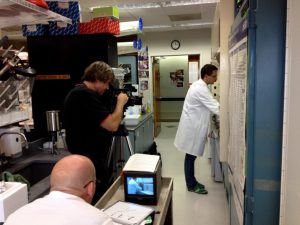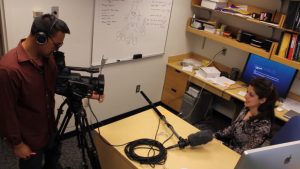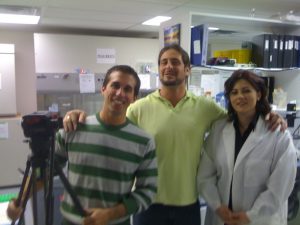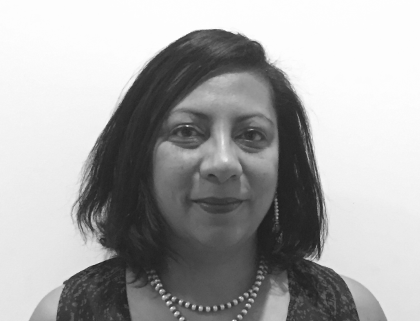The tricks and subtle nuances inherent to executing an experiment successfully can be explained more effectively by a video. The video emulates somebody actually showing you how to do an experiment. JoVE ensures that producing the video is as simple as possible for the authors.
“The quality of your production is great.” – Dr. Richard Gilbert, MD, Department of Chemistry and Chemical Biology, Northeastern University
Indeed, the JoVE videos are professionally produced. JoVE’s video department has a team of professional videographers, video editors, science writers, and professional voice-over talent. The video department is responsible for all the technical details that go into making the video.
The video production process is straightforward for the authors. The authors are responsible for the manuscript and addressing the review comments. Once accepted, it’s quite fun because a professional team takes over to produce the video. Drs. Albrecht Ott and Manuel Worst at Universität des Saarlandes say, “The video production process was perfectly organized. The experts of the production team guided us kindly through the whole procedure.”
The authors submit a methods manuscript: This manuscript gets peer reviewed. Once accepted, the JoVE video department is completely responsible for producing the video.
Science writers create a script for the video: Ph. D. level science editors storyboard the manuscript into a script for the video. The script contains the narrative associated with experimental steps that would be shown in the video. The authors review and approve this script prior to the filming. This ensures that that authors are in charge of the scientific content that goes into the video and also helps the authors prepare for the filming.
 A professional videographer films in the laboratory: A professional filmmaker, trained by JoVE, films the scientists as they demonstrate the protocol at the authors’ laboratory. He/she is responsible for all technical aspects of filming. The scientists just have to worry about showing the experiment and it can be shown in mock– like a cooking show. It’s all scripted, so this is fairly easy to do.
A professional videographer films in the laboratory: A professional filmmaker, trained by JoVE, films the scientists as they demonstrate the protocol at the authors’ laboratory. He/she is responsible for all technical aspects of filming. The scientists just have to worry about showing the experiment and it can be shown in mock– like a cooking show. It’s all scripted, so this is fairly easy to do.
Post-production takes place in Boston: The post-production includes editing the video, and syncing it with the music and the narrative. The audio is added on during the post-production in Boston, so the filming does not intrude into the work of other lab members. The authors will typically say a few words about their methodology but then the action shifts to the laboratory and the narrative is done by a professional person; the authors do not have to speak into a microphone.
 The authors approve the final video: JoVE does not publish a video without the authors’ approval.
The authors approve the final video: JoVE does not publish a video without the authors’ approval.
Dr. Yuri Bobry Shev at School of Medical Sciences -UNSW Australia, has this to say about the filming process, “It was indeed nice to deal with JoVE during the process of the preparation of the article and video. All was done professionally by your team.”
Dr. Martin Sailer at University of Basel adds, “The video production was highly professional and precise, using sophisticated techniques to correlate video content, language and illustrative graphs.”
Dr. Romain Harmancey at University of Mississippi Medical Center sums up the process nicely, emphasizing that making the video is not difficult at all. He says, “The process was much easier than I thought. The videographer was helpful, patient; we were never rushed through the experiment. Everything was much smoother than I thought.”
 Lastly but certainly not the least, kudos are due to my long time colleague, Dr Aaron Kolski-Andreaco, who started and developed the JoVE’s video department. He makes the magic happen.
Lastly but certainly not the least, kudos are due to my long time colleague, Dr Aaron Kolski-Andreaco, who started and developed the JoVE’s video department. He makes the magic happen.



